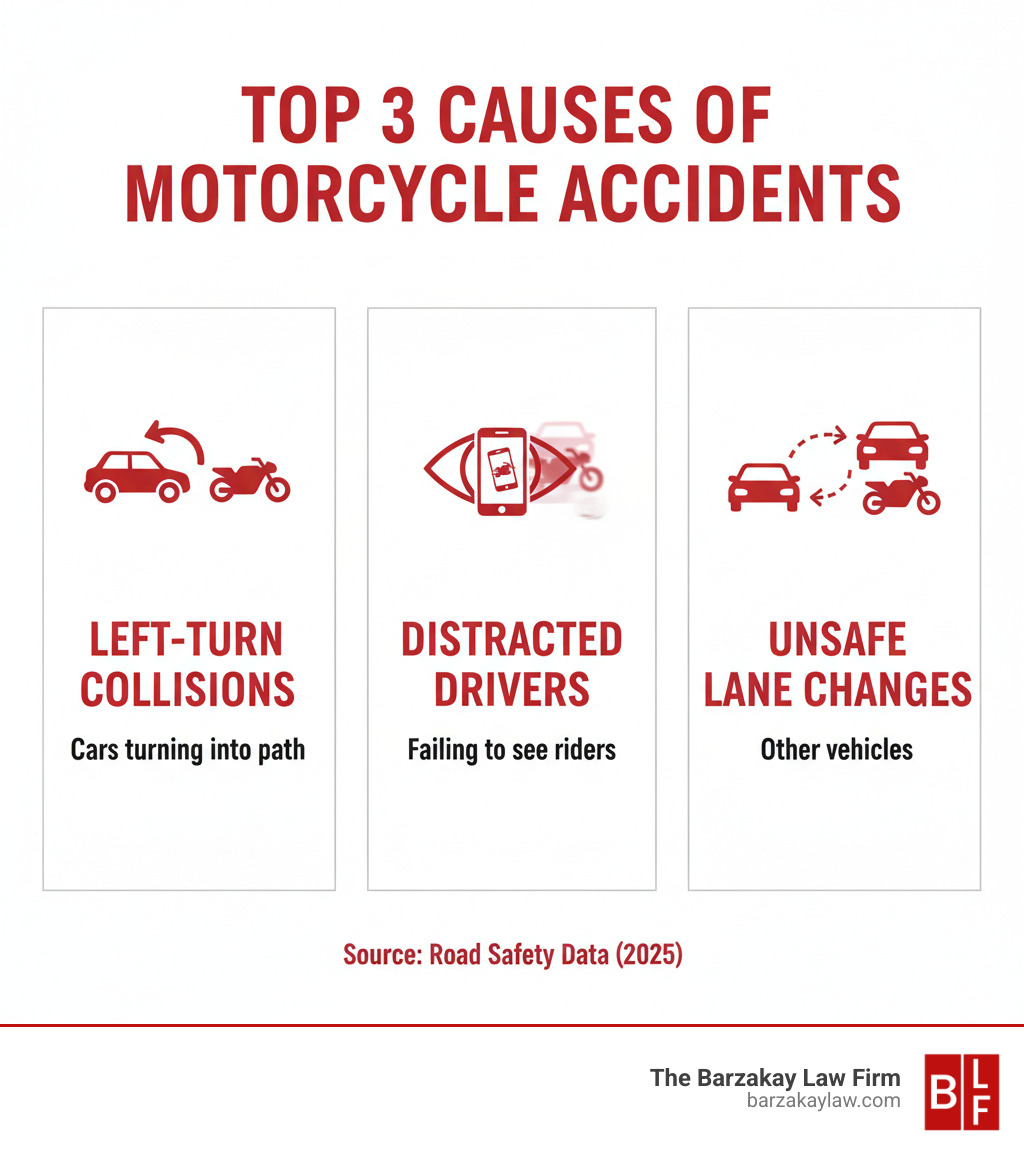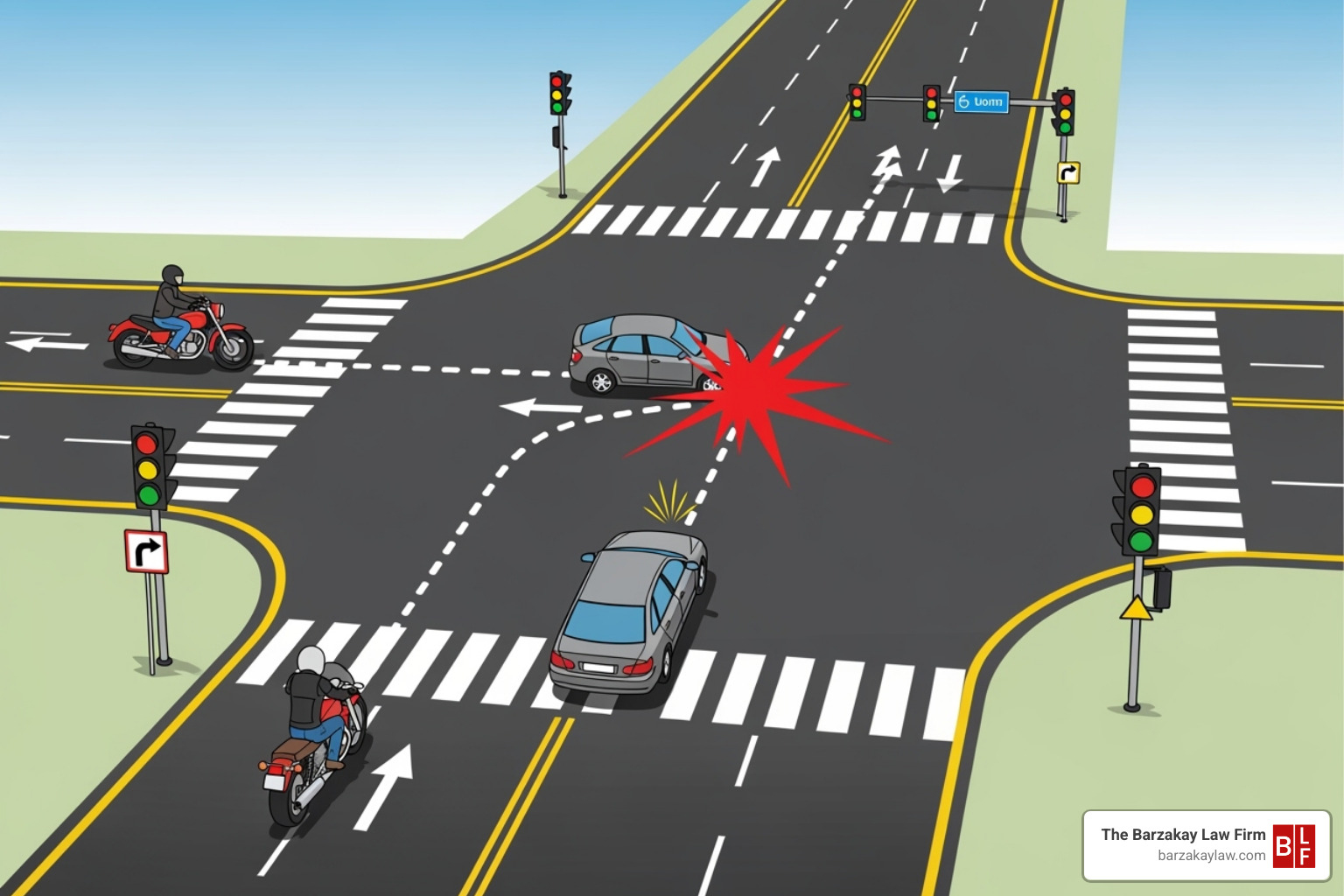Why Personal Injury Motorcycle Claims Matter in South Florida
Personal injury motorcycle accidents can turn the freedom of the open road into a nightmare in seconds. A ride along Florida’s coast can end with pain, mounting medical bills, and a confusing legal process. The risks are significant: motorcyclists are 29 times more likely to die in traffic accidents than car occupants, and 80% of motorcycle crashes result in injury or death.
Because riders have little protection, injuries to the legs, feet, head, and neck are common. Florida law adds another layer of complexity, as it doesn’t require the same insurance coverage for motorcycles as it does for cars. You also have a two-year deadline to file a lawsuit.
This guide explains what you need to know after a motorcycle accident in South Florida. Whether you’re in Miami, Hollywood, or Boca Raton, understanding your rights is the first step toward recovering fair compensation for your medical costs, lost wages, and pain and suffering. With the right information, you can focus on healing while your financial future is protected.

The Aftermath of a Crash: Immediate Steps and Common Injuries
The moments after a motorcycle crash are chaotic, but what you do next can impact your health and any future personal injury motorcycle claim. Taking the right steps protects both your well-being and your legal rights.

Post-Accident Checklist: What to Do at the Scene
Your first priority is safety. If you can, move out of traffic. Then, follow these critical steps:
- Call 911: Seek immediate medical attention, even if you feel fine. Adrenaline can mask serious injuries like internal bleeding or head trauma. A medical visit creates an official record linking your injuries to the accident.
- Call the Police: A police report is a crucial document that records the details of the crash and the officer’s initial assessment. Insurance companies and courts rely on these reports.
- Document Everything: Use your phone to take photos and videos of the scene. Capture damage to all vehicles, skid marks, road hazards, traffic signs, and your injuries. The more evidence you gather, the stronger your case.
- Exchange Information: Get contact and insurance details from all drivers involved. If there were witnesses, get their names and phone numbers. Independent accounts can be invaluable.
- Report to Your Insurer: Notify your insurance company, but stick to the facts. Do not apologize or admit fault, as a simple “I’m sorry” can be used against you. Politely decline to give a recorded statement to the other driver’s insurance adjuster until you have spoken with a lawyer.
Common Injuries in Motorcycle Accidents
Motorcyclists are exposed to the full force of a collision, often leading to severe, life-altering injuries. This vulnerability is why personal injury motorcycle claims frequently involve substantial compensation.
According to CDC data, the most common non-fatal injuries affect the legs and feet (30%) and the head and neck (22%). Common injuries include:
- Road Rash: This is more than a scrape. Severe road rash can require skin grafts, leave permanent scars, and be incredibly painful.
- Head and Neck Trauma: Even with a helmet, riders can suffer concussions, traumatic brain injuries (TBIs), and skull fractures. TBIs can cause lasting cognitive, memory, and personality changes.
- Broken Bones: Fractures to the arms, wrists, ribs, and collarbones are frequent. Leg and foot fractures are especially common and may require surgery and extensive physical therapy.
- Spinal Cord Injuries: These are among the most catastrophic injuries, potentially causing partial or complete paralysis and requiring lifelong medical care.
- Internal Injuries: Internal bleeding and organ damage can be life-threatening and may not have immediate symptoms. This is why seeing a doctor right away is critical.
- Psychological Trauma: The mental scars from an accident, such as anxiety, depression, and PTSD, are real injuries that deserve compensation.
Be aware of delayed symptoms. You might feel fine initially but develop pain, dizziness, or headaches days later. A thorough medical evaluation is non-negotiable to identify hidden injuries.
Understanding Florida’s Motorcycle Laws and Your Rights
Navigating your legal rights after a motorcycle crash in South Florida can be confusing. Florida’s motorcycle laws differ from car laws, and these differences significantly impact your personal injury motorcycle claim.
Florida Helmet Law: What You Need to Know
In Florida, riders 21 or older are not required to wear a helmet if they carry at least $10,000 in medical benefits coverage. Riders under 21 must always wear a helmet.
While riding without a helmet may be your legal right, be aware of the consequences in an accident. If you suffer a head injury, the at-fault driver’s insurance company will argue your injuries would have been less severe with a helmet. Under Florida’s comparative negligence rule, this could reduce your compensation. It’s a common tactic, but it’s important to remember: not wearing a helmet doesn’t cause an accident. We fight to ensure the focus remains on the other driver’s negligence.
Florida Insurance Requirements for Motorcyclists
This is a critical distinction for riders. Unlike car drivers, motorcyclists in Florida are not required to carry Personal Injury Protection (PIP) insurance. This means you don’t have a $10,000 policy to cover your initial medical bills regardless of fault.
Instead, you must seek compensation from the at-fault driver’s bodily injury liability insurance. This makes Uninsured/Underinsured Motorist (UM/UIM) coverage on your own policy essential. If you are hit by a driver with little or no insurance, your UM/UIM coverage can cover your medical bills, lost wages, and other damages. In our experience with cases in Miami, Hollywood, and Boca Raton, this coverage is often the key to a fair recovery.
Statute of Limitations: Time is of the Essence
In Florida, you have a strict deadline: two years from the date of the accident to file a personal injury lawsuit. If you miss this deadline, you lose your right to seek compensation forever.
Two years may seem like a long time, but building a strong case requires gathering evidence, compiling medical records, and conducting negotiations. Waiting too long can weaken your claim as evidence disappears and memories fade. Contacting a lawyer soon after your accident ensures all deadlines are met while you focus on recovery.
Can Motorcycle Passengers File Injury Claims?
Yes. If you were a passenger on a motorcycle and were injured, you have the right to file a claim. Passengers are almost never at fault for a crash. Your claim might be against the motorcycle operator’s insurance, the other driver’s insurance, or both.
While it can be uncomfortable to file a claim involving a friend or family member who was operating the bike, you are seeking compensation from their insurance company, not from them personally. Insurance exists for these exact situations.
Building Your Personal Injury Motorcycle Claim
Building a strong personal injury motorcycle claim requires proving how the accident happened and fighting back against unfair biases. We know what it takes to build a successful case for riders in Miami, Hollywood, and Boca Raton.

Common Causes of Motorcycle Accidents
Most motorcycle accidents are caused by inattentive or careless drivers. Common scenarios include:
- Left-Hand Turns: A driver turns left into the path of an oncoming motorcycle, often misjudging its speed or failing to see it at all.
- Unsafe Lane Changes: A driver changes lanes without checking their blind spot for a smaller motorcycle.
- Distracted Driving: Drivers who are texting, talking on the phone, or otherwise not paying attention fail to notice a rider until it’s too late.
- Road Hazards: Potholes, gravel, or debris that are minor annoyances for a car can be catastrophic for a motorcycle.
- “Dooring” Accidents: A person in a parked car opens their door directly in a rider’s path.
Proving Liability: The Concept of Negligence
To win your claim, we must prove the other party was negligent. This involves establishing four elements:
- Duty of Care: All drivers have a legal duty to operate their vehicles safely.
- Breach of Duty: The other driver violated that duty (e.g., by speeding or running a red light).
- Causation: The driver’s breach directly caused your accident and injuries.
- Damages: You suffered actual losses, such as medical bills and lost wages.
We use police reports, witness statements, and sometimes accident reconstruction professionals to prove negligence.
Florida’s Comparative Negligence Rule
Florida uses a pure comparative negligence system. This means you can still recover damages even if you are found partially at fault for the accident. However, your compensation will be reduced by your percentage of fault. For example, if you have $100,000 in damages but are found 20% at fault, you can recover $80,000.
Insurance companies will try to use this rule to shift blame onto you to reduce their payout. We fight back against these unfair tactics with evidence.
Overcoming Rider Bias
Motorcyclists often face unfair stereotypes of being reckless. Insurance companies exploit this bias to deny claims or make low settlement offers, suggesting the rider must have been speeding or at fault without evidence. We counter these prejudices with facts, witness testimony, and a clear presentation of what really happened, ensuring you are not blamed for another’s carelessness.
Key Differences: Motorcycle vs. Car Accident Claims
Personal injury motorcycle claims are unique for several reasons:
- Injury Severity: Riders lack the protection of a car, leading to more severe and catastrophic injuries.
- Liability Complexity: Rider bias makes proving the other driver’s fault more challenging.
- Insurance Issues: The lack of a PIP requirement for motorcycles complicates the process of getting medical bills paid.
Recoverable Damages and Dealing with Insurance Companies
After a motorcycle accident, a strong personal injury motorcycle claim should account for every way the crash has impacted your life, not just your immediate bills.
Types of Damages in a Personal Injury Motorcycle Case
Compensation, or damages, is divided into two categories.
Economic Damages
These are your measurable financial losses:
- Current and Future Medical Bills: Ambulance rides, hospital stays, surgeries, rehabilitation, and long-term care.
- Lost Wages: Income lost while you were unable to work.
- Diminished Earning Capacity: Compensation for the loss of future income if you cannot return to your previous job.
- Property Damage: The cost to repair or replace your motorcycle and other damaged property.
Non-Economic Damages
These compensate for the non-financial, human cost of the accident:
- Pain and Suffering: For the physical pain and emotional distress you’ve endured.
- Emotional Distress: For anxiety, depression, fear, or PTSD resulting from the crash.
- Loss of Enjoyment of Life: For the inability to participate in hobbies and activities you once loved.
- Scarring and Disfigurement: For permanent physical reminders of the accident.
Navigating Insurance and Hit-and-Run Accidents
Insurance companies are businesses focused on minimizing payouts. Be prepared for their tactics.
Insurance Company Tactics
- Lowball Settlement Offers: They may offer a quick, small settlement before the full extent of your injuries is known.
- Requesting a Recorded Statement: They hope you’ll say something they can use to undermine your claim.
- Blaming the Victim: They will try to use Florida’s comparative negligence rule to shift fault onto you.
- Denials and Delays: They may deny a valid claim or drag out the process, hoping you’ll give up.
We handle all communications with the insurance company to counter these tactics and protect your rights.
Hit-and-Run Accidents
If the at-fault driver flees the scene, it can be difficult to hold them accountable. This is where your Uninsured/Underinsured Motorist (UM/UIM) coverage is vital. Your own UM policy can provide the compensation you need when the responsible driver cannot be found.
Uncovering All Compensation Sources
We investigate every potential source of compensation beyond the obvious. This may include:
- Your own UM/UIM coverage.
- An at-fault driver’s excess liability or umbrella policy.
- An employer’s commercial policy if the driver was working.
- A third party, such as a municipality responsible for a dangerous road condition.
Frequently Asked Questions about Motorcycle Personal Injury Claims
After a motorcycle accident, you will have many questions. Here are answers to some common concerns we hear from riders in Hollywood, Miami, and Boca Raton about personal injury motorcycle claims.
How does not wearing a helmet affect my personal injury motorcycle claim in Florida?
Under Florida law, riders 21 and over with at least $10,000 in medical benefits are not required to wear a helmet. However, if you suffer a head injury in a crash while not wearing one, the insurance company will argue that your choice worsened your injuries. This does not prevent you from filing a claim, but it could reduce your compensation under the comparative negligence rule. We work to emphasize that the other driver’s negligence caused the accident, while the helmet issue is only related to the extent of damages.
What is the average settlement for a motorcycle accident claim?
There is no “average” settlement amount, as every case is unique. The value of your claim depends on several factors:
- The severity of your injuries: More serious injuries lead to higher value claims.
- Total medical expenses: This includes both current and projected future costs.
- Lost wages and earning capacity: How much income you have lost and will lose in the future.
- Pain and suffering: The physical and emotional impact of the accident.
- Clarity of fault: How clearly the other party was at fault.
- Available insurance coverage: The policy limits of all at-fault parties and your own UM/UIM coverage.
We evaluate all these factors to determine what your specific case is worth.
Can I sue the driver who caused my motorcycle accident?
Yes. If another driver’s negligence caused your crash, you have the right to seek compensation. This process usually begins by filing a claim with their insurance company. Our goal is to negotiate a fair settlement on your behalf. However, if the insurance company refuses to offer a fair amount, denies the claim, or if the policy limits are insufficient, filing a lawsuit becomes the next step. A lawsuit shows the insurer you are serious and are prepared to go to trial if necessary to secure the compensation you deserve. Most cases still settle before reaching a courtroom, but preparing for trial is an effective way to strengthen your negotiating position.
Conclusion: Protecting Your Future After a Crash
A personal injury motorcycle accident can be overwhelming, leaving you with physical, emotional, and financial burdens. You do not have to steer this difficult journey alone. Understanding your rights and acting quickly are key to securing the compensation you need to recover.

Time is critical due to Florida’s two-year statute of limitations. Documenting everything and seeking legal guidance early on will strengthen your claim. Be prepared for insurance companies to try to minimize your payout or shift blame.
At The Barzakay Law Firm, we believe you should focus on healing while we handle the legal fight. We understand the unique challenges riders face in South Florida, from severe injuries to unfair biases. Our firm serves clients in Miami, Hollywood, Boca Raton, Sunrise, Orlando, and Fort Lauderdale on a contingency fee basis, meaning you pay nothing unless we win your case.
Don’t face the insurance companies alone. Let us fight for the justice and compensation you deserve.
Schedule a free consultation to discuss your Miami bike accident case today.
